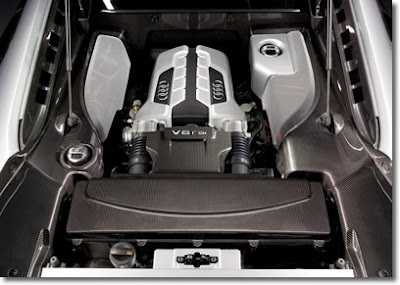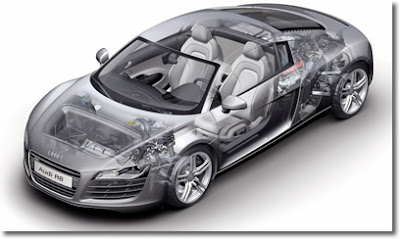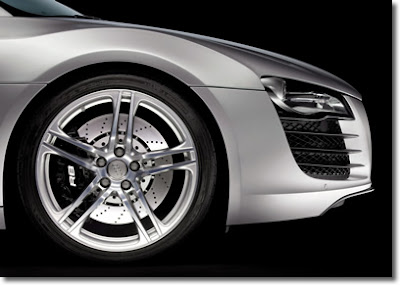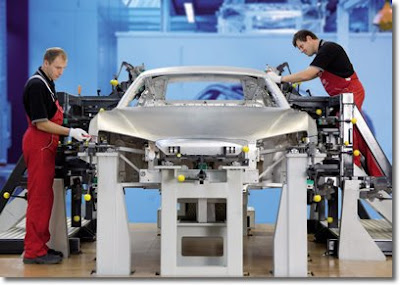
Audi unveiled the R8 - its first ever mid-engine sports cars -- for the 2008 model year. Sales began in the first half of 2007 for the
The car has a 420 horsepower high-revving V8 engine and all-wheel-drive. It uses the mid-engine Lamborghini Gallardo platform, and will somewhere between $80,000 and $110,000 - positioning it squarely against the BMW M6, Porsche 911, and Aston Martin Vantage.
 It features a choice of LED or Xenon headlamps surrounded by LED running lights and indicators. LEDs are also used in the engine bay to make the impressive V8 visible even at night.
It features a choice of LED or Xenon headlamps surrounded by LED running lights and indicators. LEDs are also used in the engine bay to make the impressive V8 visible even at night.
 Both a standard manual and an automated manual transmission will be offered. Claimed 0 to 62 mph time is 4.6 seconds, though this number is likely conservative.
Both a standard manual and an automated manual transmission will be offered. Claimed 0 to 62 mph time is 4.6 seconds, though this number is likely conservative.
Interior
The interior has a driver-oriented cockpit architecture, integrating the driver between the dashboard and the high centre console. The instrument panel above the console is angled slightly towards the driver. The flat-bottomed steering wheel is a typical feature of the sportiest Audi models, and also enables comfortable sports car entry and exit.
 The sports seats are trimmed as standard in a Leather/Alcantara combination, or optionally in full leather. Alternatively, the R8 can also be fitted with bucket seats, specially developed by quattro GmbH. There is plenty of room for the two occupants, with comfort levels well beyond the norm of high-performance sports cars. There is space behind the seats to stow large bags, or even two golf bags. The luggage compartment at the front has a capacity of 100 litres.
The sports seats are trimmed as standard in a Leather/Alcantara combination, or optionally in full leather. Alternatively, the R8 can also be fitted with bucket seats, specially developed by quattro GmbH. There is plenty of room for the two occupants, with comfort levels well beyond the norm of high-performance sports cars. There is space behind the seats to stow large bags, or even two golf bags. The luggage compartment at the front has a capacity of 100 litres.
 With numerous trim variants and applications in Piano finish or Carbon sigma, there are few limits to the range of customisation options for the interior.
With numerous trim variants and applications in Piano finish or Carbon sigma, there are few limits to the range of customisation options for the interior.
The drivetrain
At 7,800 rpm the 4.2-litre engine delivers 309 kW (420 bhp) of power output. Peak torque is 430 Newton-metres from 4.500 to 6,000 rpm. And no less than 90 per cent of this maximum torque is maintained consistently throughout a wide engine speed range from 3,500 all the way to 7,600 rpm. As a result of these qualities, the eight-cylinder power unit provides ample thrust in most driving situation.
 The engine is a high-revving unit. The maximum engine speed is 8,250 rpm. Two transmissions are available: a manual 6-speed gearbox or optionally the Audi R tronic sequential-shift gearbox, with a joystick gear-shift on the centre console and, most especially, the paddles mounted on the steering wheel. 'Shift by wire' technology provides for very fast gear-shifting and an outstanding power-to-weight ratio, allied to compact gearbox dimensions. The Sport mode, with its fast shifting, guarantees the absolute maximum in terms of driving fun. An automatic mode can also be selected.
The engine is a high-revving unit. The maximum engine speed is 8,250 rpm. Two transmissions are available: a manual 6-speed gearbox or optionally the Audi R tronic sequential-shift gearbox, with a joystick gear-shift on the centre console and, most especially, the paddles mounted on the steering wheel. 'Shift by wire' technology provides for very fast gear-shifting and an outstanding power-to-weight ratio, allied to compact gearbox dimensions. The Sport mode, with its fast shifting, guarantees the absolute maximum in terms of driving fun. An automatic mode can also be selected.
The car is fitted with permanent four-wheel drive, which distributes the power variably to the front and rear axles by way of a viscous clutch. On the Audi R8 the legendary quattro system is adapted to the axle load distribution typical of mid-engined cars.
 The chassis
The chassis
The chassis features forged aluminium double wishbones at the front and rear. At the front they are triangulated, while at the rear the top one is triangulated and the bottom one is a triangulated wishbone with a track rod. This provides for optimum wheel control, and is a geometry which has proved itself to be the ideal solution in delivering agility, maximum steering precision and precisely defined self-steering characteristics.
 Direct, hydraulic rack-and-pinion steering provides optimum feedback to assist the driver.
Direct, hydraulic rack-and-pinion steering provides optimum feedback to assist the driver.
The spring and damper set-up is stiff in order to deliver maximum driving dynamics, while still providing a quite astonishing level of ride comfort. This is particularly true when the 'Audi magnetic ride' adaptive damper system is chosen as an alternative to the standard gas-filled shock absorbers.
Instead of the conventional damper fluid, a magnetorheological fluid is used -- in other words, a fluid whose viscosity can be influenced by an electromagnetic field. This effect enables the damping characteristic to be influenced electronically at will and instantaneously, by applying a voltage to the electromagnets.
Audi magnetic ride uses this property to deliver the correct damping forces in every driving situation. A computer determines the prevailing driving situation in a matter of milliseconds. Drivers can choose from two driving programs depending on whether they want to drive in a highly sporty style -- with the magnetorheological fluid adjusted to a low viscosity -- or with the emphasis more on ride comfort.

The Audi R8 is fitted with 6-arm 18-inch wheels as standard, and can optionally be ordered with 19-inch wheels. The 235/40 size tyres at the front and up to 285/35 at the rear provide the necessary road-holding. The mid-engined sports car's long wheelbase and extremely low centre of gravity ensure that it always retains maximum stability.

Equipment and trim
Xenon plus lights, LED rear lights and daytime running lights, 18-inch aluminium wheels, an audio system with 7-inch monitor, an anti-theft alarm and Leather/Alcantara interior trim are just some of the items on the extensive list of standard features.

The range of optional extras includes a Bang & Olufsen sound system, featuring an output of 465 watts and 12 specially designed speakers. A microphone-based vehicle noise compensation system adjusts audio levels to changing road conditions and speeds.
The acoustic parking system and a rear-view camera help the driver to manoeuvre into even the tightest of spaces. The radio/navigation system plus, featuring a large-format colour monitor and MMI keypad, combines extensive functionality with extreme user-friendliness.
A total of eight exterior colours are available, from Ibis White to Phantom Black, pearl effect.

Craftsmanship
The Audi R8 is being built on a small-lot production line in a specially constructed new block at the Audi plant in Neckarsulm. The entire production process - from the bodyshell construction to final assembly - is organized in the same way as a craft workshop. Small teams of specialists accompany every step of production, ensuring that every one of the maximum of 15 cars per day built is up to quality standards.